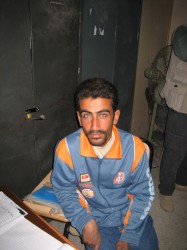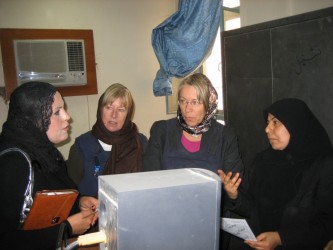
This week I went down town with our Youth Employment Adviser, Sue Lowman, and the DFID Regional Director covering Iraq, Sue Wardell, to the Basra Employment Centre, the Iraqi equivalent of a UK jobcentre. The purpose of the trip was to meet with the DFID funded Youth Unemployment Task Force and to meet some young unemployed Basrawis who’d be eligible for the scheme.
As everyone familiar with Basra knows unemployment is one of the major issues facing the city – and particularly unemployment of young people. Not only is this unemployment a significant cause of disaffection, it also provides a pool of potential recruits for the militias, who prey upon the disaffection of young men to recruit them.
While hard data is hard to come by – and estimates very depending upon who you talk to - there’s a consensus that unemployment is at very significant levels. Within this, 120,000 young people are registered unemployed, and we reckon that nearly 85,000 young Basrawis come in to the labour market every year.
One way we are trying to tackle this problem is by starting a pilot project to provide job training and employment placements for 500 young Basrawis. This scheme has been developed with the Youth Unemployment Task Force – comprised of heads of the vocational training colleges in the province, representatives from 100 local employers who will provide job placements, the head of Basra’s employment centre, the Basra Development Commission, and Non-Governmental Organisations. What’s particularly impressive about this initiative - and was demonstrated by Sue’s meeting with the Task Force - was the degree of Iraqi commitment and enthusiasm for the initiative.
The young Basrawis selected under the programme will receive on and off the job training and training allowances of $170 per month. The hundred local employers who have signed up to the scheme will then provide real job placements to the students after their training.
While five hundred may seem like a drop in the ocean relative to the problem, the significance of this initiative is that it is the first time in Iraq that a programme has been set up which links the needs of employers with the needs of young unemployed Basrawis. We are also optimistic that if successful the Iraqi authorities will take over and expand the scheme. This initiative is also only one of the ways in which we are tackling unemployment, others include our work to attract inward foreign investment and to increase the availability of credit for businesses.

Following our meeting with the task force we had a tour of the Employment Centre. Particularly interesting was the computer centre which was staffed entirely by women – apparently in Iraq work with computers is viewed as a female domain. We also had a chance to meet a number of unemployed young Basrawi men who told us of the lack of employment and training opportunities and also the lack of support from state authorities – there’s little incentive to register as the state has limited capacity to support people in finding work. However, we are hopeful that our employment scheme – along with our other work to attract foreign investment - will start turning this situation around, capitalising on the enthusiasm of the Iraqi people and bringing the skilled jobs that they need.

Recent Comments